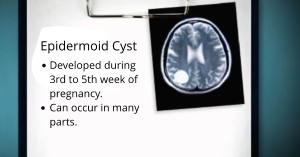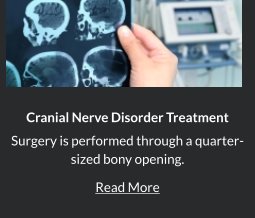Epidermoid Cyst Newport Beach & Orange County, CA
Epidermoid Cyst Treatment in Orange County
 An epidermoid cyst is congenital, rarely acquired, and forms at fetal development during the 3rd to 5th week of pregnancy when normal developmental cells are trapped within the growing brain. This slow-growing cyst can occur in many parts of the brain, but mostly in the cranial base. The cranial base is a highly complex and anatomically challenging region, comprising the base of the cranium, the ventral surface of the brain and brainstem, and the nerves, arteries, and veins entering and exiting the skull.
An epidermoid cyst is congenital, rarely acquired, and forms at fetal development during the 3rd to 5th week of pregnancy when normal developmental cells are trapped within the growing brain. This slow-growing cyst can occur in many parts of the brain, but mostly in the cranial base. The cranial base is a highly complex and anatomically challenging region, comprising the base of the cranium, the ventral surface of the brain and brainstem, and the nerves, arteries, and veins entering and exiting the skull.
Robert Louis, MD, a fellowship-trained Orange County Neurosurgeon, is the Director of the Skull Base and Pituitary Tumor Program at Hoag Memorial Hospital in Orange County, California. Dr. Louis has particular expertise in the endoscopic and minimally invasive treatment of benign and malignant brain tumors, sellar and parasellar tumors, and skull base tumors. Dr. Robert Louis specializes in minimally invasive brain surgery for the treatment of sinonasal carcinoma. For appointments, please call (949) 383-4185 or Contact Us.
















